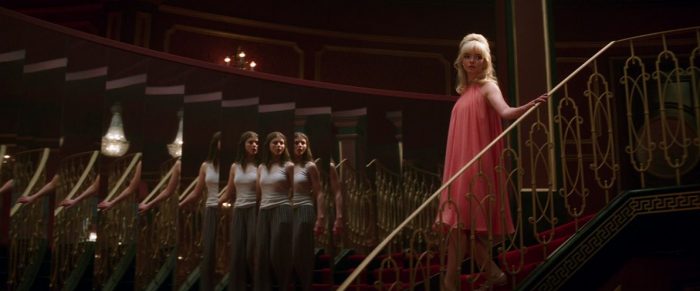Reviewed by Jeffrey Sanzel
Director Edgar Wright’s best-known work includes Hot Fuzz, Shaun of the Dead, Scott Pilgrim vs. the World, and Baby Driver. In a strong departure from his more satiric work, Last Night in Soho is an entertaining psychological thriller, mixing familiar tropes with clever, original ideas. Wright nods towards British horror films of an earlier era and a shadowy look at the “Swinging Sixties.” If the ending does not quite live up to its potential, it is a minor cavil in a fast-paced two hours.
Eloise (a riveting Thomasin McKenzie) leaves her sheltered Cornwall home for London to study fashion design. After her mother’s death (due to an unspecified mental illness that drove her to suicide), “Ellie” was raised by her grandmother (fluttering and supportive Rita Tushingham). Ellie has two passions: fashion and the 1960s, illustrated in a spot-on (if a bit on-the-nose) opening with her dancing in a newspaper gown to the sounds of “A World Without Love.” However, rather than feeling precious, there is more than a hint of frailty and even menace in a seemingly benign sequence.

While anxious to have a career in high fashion to which her mother aspired, scholarship student Ellie finds the cutthroat university world overwhelming. Her roommate, mean girl Jocasta (Synnøve Karlsen, doing the best she can with the caricature), drives her out of their shared student housing.
Ellie rents a top-floor apartment from the no-nonsense Ms. Collins (the final performance of the great Diana Rigg). Once ensconced in the bedsitter, Ellie begins having visions of Sandie (The Queen’s Gambit’s Anya Taylor-Joy, radiant and disturbed in equal measure). Sandie is a self-assured would-be singer in an idealized, peripatetic 1960s London.
Whether Ellie is transported back to 1965 or is having visions (or both) is part of the premise. Sometimes she sees herself reflected as Sandie. Other times, Ellie is outside Sandie, watching her. In any case, she experiences what Sandie does. At first, Ellie is delighted, finding joy in the new feelings. But quickly, the encounters turn. A talent manager, Jack (Matt Smith, oily and dangerous), engages Sandie. But Jack is a vicious, manipulative pimp, and Sandie’s life becomes a nightmare from which Ellie cannot escape.
Terence Stamp makes the most of a mysterious gentleman who seems to straddle both worlds, haunting Ellie in the pub where she has taken a job as well as the neighborhood itself. Michael Ajao’s John is warm and fully present as the fellow student who has feelings for Ellie. He owns the tricky balance of supporting Ellie but not furthering what he perceives as her delusions.
Rigg mines depth in the wry and knowing landlady, with a final scene that skirts predictability through a dimensional, effortless, and mesmerizing performance.
The film is strongest when it leans into the psychological elements of the story. The screenplay, by director Wright, along with Krysty Wilson-Cairns, presents two conflicted heroines.
Ellie battles with inner demons that prevent her from adjusting to city life. The struggles are fully awakened—and acerbated—by her presence in the room where Sandie lived. Sandie fights the terrors of her horrific day-to-day life of fear and forced prostitution. Wright has created a relationship that is complementary and symbiotic and that somehow runs parallel and intersects.
Both McKenzie and Taylor-Joy give extraordinary, textured performances, showing two individuals in search of identity. (There are some obvious but nonetheless telling moments dealing with names.) Both actors palpably manifest a powerful connection in their disconnected worlds.
Wright has used his soundtrack to great advantage, using the songs as commentary on the narrative. The nearly two dozen numbers include “Wishin’ and Hopin’,” “You’re My World,” “Puppet on a String,” “(Love Is Like a) Heatwave,” “Don’t Throw Your Love Away,” and Taylor-Joy’s acapella rendition of Petula Clark’s signature “Downtown” which is simultaneously alluring and chilling.
Clearly, Roman Polanski’s Repulsion has inspired Wright; the 1965 Catherine Deneuve film dealt with sex, violence, and a descent into madness. Where Last Night in Soho is weakest is in the horror department. The spirits take on an almost creature-feature appearance and undermine the more cerebral, edgier aspects. Cinematographer Chung-hoon Chung presents a muted present-day London while the flashbacks are initially vivid and colorful before shifting to darker hues as Sandie’s world crumbles.
While by no means a perfect film, Last Night in Soho is an excellent antidote for mindless slasher films (Halloween Kills) that seem to spring up this time of year. The film offers strong performances and an entertaining, twisty addition to the world of psychological thrillers.
Rated R, Last Night in Soho is now playing in local theaters.





